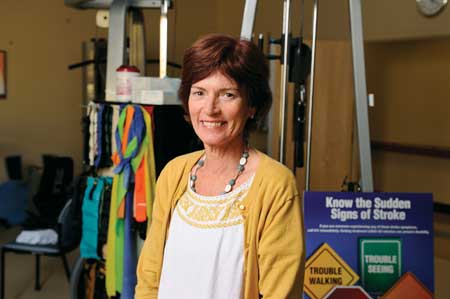Stroke Program Coordinator Makes Statewide Impacts
by Sharon Sopp
Time is of the essence when an individual experiences stroke or cardiac symptoms. The sooner the patient seeks treatment, the sooner appropriate care can be administered, thus helping prevent further damage and encouraging a positive recovery. Taking the lead to improve outcomes for stroke as well as cardiac patients is Howard County General Hospital’s (HCGH) stroke program coordinator, Susan Groman, BS, RN.
As HCGH’s stroke program coordinator—a program she helped create—Groman is instrumental in increasing the hospital staff’s knowledge and the general public’s knowledge about stroke and stroke risks. She schedules physicians to give educational presentations and participates in the Wellness Center’s (HCGH’s community education program) health promotion events such as blood pressure and carotid artery screenings. By working together, Groman and the Wellness Center brought the American Heart Association’s (AHA) Stroke Ambassador Program to the county, which provides outreach and education to the public.

Her ongoing work with Howard County Fire and Rescue Services has enhanced an already outstanding collaborative relationship and helps ensure that the Emergency Medical Services (EMS) teams are properly trained and that the processes between the EMS crews and the Emergency Department (ED) are efficient and effective for stroke and heart attack patients. She revised an existing radio report form completed by ED staff when the EMS crew calls with information about a patient. Her revised form includes specific protocols about stroke and heart attack. Careful review of these forms allows Groman to provide feedback to the EMS crews and ED staff as well as track critical information and further improve procedures. In fact, the model Groman developed has been put forth by the Maryland Institute for Emergency Medical Services Systems (MIEMSS) as a model for other Maryland hospitals.
Groman also joined with her colleagues throughout Maryland to establish the
Maryland Stroke Coordinator Consor-tium, of which she is the current co-president. Consortium members share information about best practices and work to make sure stroke data is collected uniformly throughout Maryland for the AHA’s Get With The Guidelines®–Stroke (GWTG) program. The GWTG program helps hospitals across the country improve outcomes in stroke patients by ensuring that stroke care provided is based on the latest scientific guidelines.
Under her guidance, HCGH has been recognized by the AHA with GWTG Bronze, Silver, and Gold Plus Performance Achievement Awards. It also received the Primary Stroke Center designation from the MIEMSS in March 2008. “Her efforts have ensured that HCGH meets or exceeds the standards for stroke treatment,” says Debbie Fleischmann, MPA, RN, director of education and professional development at HCGH.
Groman’s efforts, from educating the residents of the county about stroke warning signs and ensuring prompt treatment by EMS and ED staff to encouraging patient rehabilitation and running stroke survivor support groups, have also ensured that stroke and cardiac patients across the state have a much better shot at rapid treatment—and significant recovery.